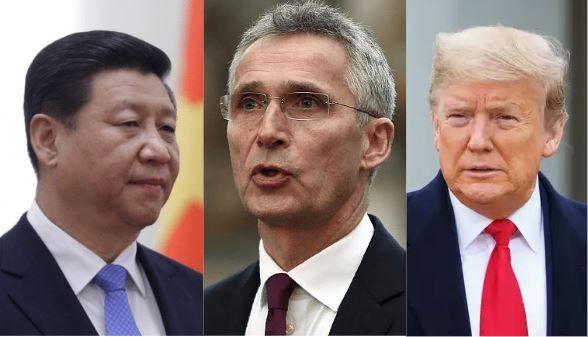The Coronavirus Pandemic has forced the world into introspection on a single issue- China’s rise into a hawkish and belligerent superpower. Till a few months ago, large parts of the world were living in ignorance about the threats that China’s economic and strategic domineering posed to the world at large. But there is increasing realisation about the need to reshape supply chains and cut China to size.
These are changing times and the world’s most powerful intergovernmental military alliance- the North Atlantic North Atlantic Treaty Organization (NATO) is also looking to recalibrate its strategy with an increased focus on China. NATO Secretary General Jens Stoltenberg said, “The rise of China is fundamentally shifting the global balance of power … Multiplying the threats to open societies and individual freedoms and increasing the competition over our values and our way of life.”
He also urged “like-minded countries” to join the military alliance to stand up against “bullying and coercion” in world affairs.
These are signs of the first major departure in NATO strategy as the focus shifts from Russia to the People’s Republic of China. The Trans-Atlantic security alliance was formed with American initiative in 1949 out of the anti-Communist fervour of that era.
For the next four decades, it fulfilled its responsibility of securing peace to the Member States in the context of the Cold War. The Cold War period between the US and its allies on one side, and the Soviet bloc on the other side was an era with proper definition of who will fight whom in military conflicts.
But dramatic changes happened starting 1989, and as the Cold War ended with Soviet disintegration, the NATO itself faced an identity crisis. NATO faces a definitional issue- when the enemy in Soviet Union no longer exists, what do the Member States look forward to?
The calls for its dissolution have fell on deaf ears and the NATO Members constantly face the uphill task of defining the strategic challenges that it faces. It is only when the challenges are properly defined that the military alliance can formulate policies and responses to those challenges.
Russia is clearly not a threat as big as the Soviet bloc was perceived to be, yet the NATO has focussed on Moscow alone. Russia’s annexation of Crimea in 2014 did give a new lease of life to the relevance of the NATO in a Post-Cold War era, but that enthusiasm has since faded out.
Another school of thought is that China’s emergence is the real threat the Transatlantic organisation today faces. After all, there is no doubt about the fact that today the Dragon is a much more powerful and influential than Russia. Though Russia keeps doing much of the heavy-lifting on the international platforms, it is China which is the real threat to the open societies of the world including the NATO allies.
Washington has grown aware of the challenges that Beijing poses, and especially with the Trump administration coming at the helm of affairs there has been a strategic shift in American thinking away from Russia. The centre of American strategic thought today is, of course, Beijing.
In the pre-Coronavirus world, the United States and its European allies did not share a common vision of the deleterious consequences of the Dragon’s disruptive rise into an Asian hegemon. But now things are becoming clearer as the NATO itself seems to be shifting its focus towards China as a “threat” alongside Russia.
The NATO Secretary General, Jens Stoltenberg also happens to be the former Prime Minister of Norway and thus he expresses greater acceptability towards the idea of recognising China as the real “threat” even outside Washington.
Stoltenberg was careful to add, “NATO does not see China as the new enemy or an adversary.”
However, he also said, “But … they [the Chinese] already have the second largest defence budget [in the world]. They are investing heavily in modern military capabilities, including missiles that can reach all NATO-allied countries.”
The man overseeing NATO affairs also recognised how the growing influence of Chinese forces has a “security concern” for the Trans-Atlantic military alliance. He said, “We see them [Chinese forces] in the Arctic, in Africa. We see them investing in our critical infrastructure. And they are working more and more together with Russia. All of this has a security consequence for NATO allies.”
The former Norwegian Prime Minister, Stoltenberg made these remarks while discussing how to reshape NATO in the next 10 years.
NATO Secretary General has made these remarks in the backdrop of Donald Trump’s face-off with Germany’s Chancellor Angela Merkel. Trump administration doesn’t see NATO as a unified bloc and the sentiment gets hardened when an ally doesn’t support the US political leadership’s ongoing tussles with China.
Merkel had reluctant to appear for the G7 summit that was supposed to take place in June due to Cotinavirus, the European Union has been supportive of Beijing under her de facto leadership. Trump is keen to mark the G7 summit as the world’s return to normalcy with a more powerful USA-dominated and anti-China liberal world order.
Amidst this conflict of opinion, Trump has decided to cut 9,500 troops from the German NATO base. Trump and NATO leadership are trying to make it clear that the NATO has to be returned into the Post-Cold War realities. The military alliance ought to shift focus onto China and those Members who try to disrupt this common vision, like the Merkel government in Germany will find their NATO security arrangement at risk.

